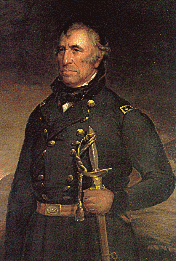
|

|
He spent a quarter of a century policing the frontiers against Indians. In the Mexican War he won major victories at Monterrey and Buena Vista.
President Polk, disturbed by General Taylor's informal habits of command and perhaps his Whiggery as well, kept him in northern Mexico and sent an expedition under Gen. Winfield Scott to capture Mexico City. Taylor, incensed, thought that "the battle of Buena Vista opened the road to the city of Mexico and the halls of Montezuma, that others might revel in them."
"Old Rough and Ready's" homespun ways were political assets. His long military record would appeal to northerners; his ownership of 100 slaves would lure southern votes. He had not committed himself on troublesome issues. The Whigs nominated him to run against the Democratic candidate, Lewis Cass, who favored letting the residents of territories decide for themselves whether they wanted slavery.
In protest against Taylor the slaveholder and Cass the advocate of "squatter sovereignty," northerners who opposed extension of slavery into territories formed a Free Soil Party and nominated Martin Van Buren. In a close election, the Free Soilers pulled enough votes away from Cass to elect Taylor.
Although Taylor had subscribed to Whig principles of legislative leadership, he was not inclined to be a puppet of Whig leaders in Congress. He acted at times as though he were above parties and politics. As disheveled as always, Taylor tried to run his administration in the same rule-of-thumb fashion with which he had fought Indians.
Traditionally, people could decide whether they wanted slavery when they drew up new state constitutions. Therefore, to end the dispute over slavery in new areas, Taylor urged settlers in New Mexico and California to draft constitutions and apply for statehood, bypassing the territorial stage.
Southerners were furious, since neither state constitution was likely to permit slavery; Members of Congress were dismayed, since they felt the President was usurping their policy-making prerogatives. In addition, Taylor's solution ignored several acute side issues: the northern dislike of the slave market operating in the District of Columbia; and the southern demands for a more stringent fugitive slave law.
In February 1850 President Taylor had held a stormy conference with southern leaders who threatened secession. He told them that if necessary to enforce the laws, he personally would lead the Army. Persons "taken in rebellion against the Union, he would hang ... with less reluctance than he had hanged deserters and spies in Mexico." He never wavered.
Then events took an unexpected turn. After participating in ceremonies at the Washington Monument on a blistering July 4, Taylor fell ill; within five days he was dead. After his death, the forces of compromise triumphed, but the war Taylor had been willing to face came 11 years later. In it, his only son Richard served as a general in the Confederate Army.

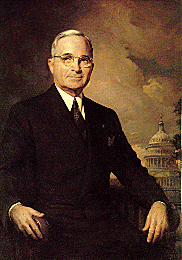
|
Truman was born in Lamar, Missouri, in 1884. He grew up in Independence, and for 12 years prospered as a Missouri farmer. He went to France during World War I as a captain in the Field Artillery. Returning, he married Elizabeth Virginia Wallace, and opened a haberdashery in Kansas City.
Active in the Democratic Party, Truman was elected a judge of the Jackson County Court (an administrative position) in 1922. He became a Senator in 1934. During World War II he headed the Senate war investigating committee, checking into waste and corruption and saving perhaps as much as 15 billion dollars. As President, Truman made some of the most crucial decisions in history. Soon after V-E Day, the war against Japan had reached its final stage. An urgent plea to Japan to surrender was rejected. Truman, after consultations with his advisers, ordered atomic bombs dropped on cities devoted to war work. Two were Hiroshima and Nagasaki. Japanese surrender quickly followed.
In June 1945 Truman witnessed the signing of the charter of the United Nations, hopefully established to preserve peace. Thus far, he had followed his predecessor's policies, but he soon developed his own. He presented to Congress a 21-point program, proposing the expansion of Social Security, a full-employment program, a permanent Fair Employment Practices Act, and public housing and slum clearance. The program, Truman wrote, "symbolizes for me my assumption of the office of President in my own right." It became known as the Fair Deal.
Dangers and crises marked the foreign scene as Truman campaigned successfully in 1948. In foreign affairs he was already providing his most effective leadership.
In 1947 as the Soviet Union pressured Turkey and, through guerrillas, threatened to take over Greece, he asked Congress to aid the two countries, enunciating the program that bears his name--the Truman Doctrine. The Marshall Plan, named for his Secretary of State, stimulated spectacular economic recovery in war-torn western Europe.
When the Russians blockaded the western sectors of Berlin in 1948, Truman created a massive airlift to supply Berliners until the Russians backed down. Meanwhile, he was negotiating a military alliance to protect Western nations, the North Atlantic Treaty Organization, established in 1949.
In June 1950, when the Communist government of North Korea attacked South Korea, Truman conferred promptly with his military advisers. There was, he wrote, "complete, almost unspoken acceptance on the part of everyone that whatever had to be done to meet this aggression had to be done. There was no suggestion from anyone that either the United Nations or the United States could back away from it."
A long, discouraging struggle ensued as U.N. forces held a line above the old boundary of South Korea. Truman kept the war a limited one, rather than risk a major conflict with China and perhaps Russia.
Deciding not to run again, he retired to Independence; at age 88, he died December 26, 1972, after a stubborn fight for life.


|
Born in Virginia in 1790, he was raised believing that the Constitution must be strictly construed. He never wavered from this conviction. He attended the College of William and Mary and studied law.
Serving in the House of Representatives from 1816 to 1821, Tyler voted against most nationalist legislation and opposed the Missouri Compromise. After leaving the House he served twice as Governor of Virginia. As a Senator he reluctantly supported Jackson for President as a choice of evils. Tyler soon joined the states' rights Southerners in Congress who banded with Henry Clay, Daniel Webster, and their newly formed Whig party opposing President Jackson.
The Whigs nominated Tyler for Vice President in 1840, hoping for support from southern states'-righters who could not stomach Jacksonian Democracy. The slogan "Tippecanoe and Tyler Too" implied flagwaving nationalism plus a dash of southern sectionalism.
Clay, intending to keep party leadership in his own hands, minimized his nationalist views temporarily; Webster proclaimed himself "a Jeffersonian Democrat." But after the election, both men tried to dominate "Old Tippecanoe."
Tyler was ready to compromise on the banking question, but Clay would not budge. He would not accept Tyler's "exchequer system," and Tyler vetoed Clay's bill to establish a National Bank with branches in several states. A similar bank bill was passed by Congress. But again, on states' rights grounds, Tyler vetoed it. In retaliation, the Whigs expelled Tyler from their party. All the Cabinet resigned but Secretary of State Webster. A year later when Tyler vetoed a tariff bill, the first impeachment resolution against a President was introduced in the House of Representatives. A committee headed by Representative John Quincy Adams reported that the President had misused the veto power, but the resolution failed.
Despite their differences, President Tyler and the Whig Congress enacted much positive legislation. The "Log-Cabin" bill enabled a settler to claim 160 acres of land before it was offered publicly for sale, and later pay $1.25 an acre for it.
In 1842 Tyler did sign a tariff bill protecting northern manufacturers. The Webster-Ashburton treaty ended a Canadian boundary dispute; in 1845 Texas was annexed.
The administration of this states'-righter strengthened the Presidency. But it also increased sectional cleavage that led toward civil war. By the end of his term, Tyler had replaced the original Whig Cabinet with southern conservatives. In 1844 Calhoun became Secretary of State. Later these men returned to the Democratic Party, committed to the preservation of states' rights, planter interests, and the institution of slavery. Whigs became more representative of northern business and farming interests. When the first southern states seceded in 1861, Tyler led a compromise movement; failing, he worked to create the Southern Confederacy. He died in 1862, a member of the Confederate House of Representatives.

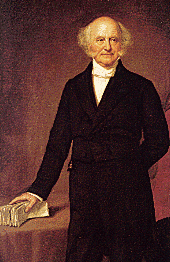
|
As a young lawyer he became involved in New York politics. As leader of the "Albany Regency," an effective New York political organization, he shrewdly dispensed public offices and bounty in a fashion calculated to bring votes. Yet he faithfully fulfilled official duties, and in 1821 was elected to the United States Senate. By 1827 he had emerged as the principal northern leader for Andrew Jackson. President Jackson rewarded Van Buren by appointing him Secretary of State. As the Cabinet Members appointed at John C. Calhoun's recommendation began to demonstrate only secondary loyalty to Jackson, Van Buren emerged as the President's most trusted adviser. Jackson referred to him as, "a true man with no guile."
The rift in the Cabinet became serious because of Jackson's differences with Calhoun, a Presidential aspirant. Van Buren suggested a way out of an eventual impasse: he and Secretary of War Eaton resigned, so that Calhoun men would also resign. Jackson appointed a new Cabinet, and sought again to reward Van Buren by appointing him Minister to Great Britain. Vice President Calhoun, as President of the Senate, cast the deciding vote against the appointment--and made a martyr of Van Buren. The "Little Magician" was elected Vice President on the Jacksonian ticket in 1832, and won the Presidency in 1836.
Van Buren devoted his Inaugural Address to a discourse upon the American experiment as an example to the rest of the world. The country was prosperous, but less than three months later the panic of 1837 punctured the prosperity.
Basically the trouble was the 19th-century cyclical economy of "boom and bust," which was following its regular pattern, but Jackson's financial measures contributed to the crash. His destruction of the Second Bank of the United States had removed restrictions upon the inflationary practices of some state banks; wild speculation in lands, based on easy bank credit, had swept the West. To end this speculation, Jackson in 1836 had issued a Specie Circular requiring that lands be purchased with hard money--gold or silver.
In 1837 the panic began. Hundreds of banks and businesses failed. Thousands lost their lands. For about five years the United States was wracked by the worst depression thus far in its history. Programs applied decades later to alleviate economic crisis eluded both Van Buren and his opponents. Van Buren's remedy--continuing Jackson's deflationary policies--only deepened and prolonged the depression.
Declaring that the panic was due to recklessness in business and overexpansion of credit, Van Buren devoted himself to maintaining the solvency of the national Government. He opposed not only the creation of a new Bank of the United States but also the placing of Government funds in state banks. He fought for the establishment of an independent treasury system to handle Government transactions. As for Federal aid to internal improvements, he cut off expenditures so completely that the Government even sold the tools it had used on public works.
Inclined more and more to oppose the expansion of slavery, Van Buren blocked the annexation of Texas because it assuredly would add to slave territory--and it might bring war with Mexico. Defeated by the Whigs in 1840 for reelection, he was an unsuccessful candidate for President on the Free Soil ticket in 1848. He died in 1862.

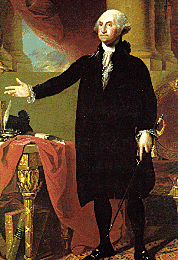
|
Born in 1732 into a Virginia planter family, he learned the morals, manners, and body of knowledge requisite for an 18th century Virginia gentleman.
He pursued two intertwined interests: military arts and western expansion. At 16 he helped survey Shenandoah lands for Thomas, Lord Fairfax. Commissioned a lieutenant colonel in 1754, he fought the first skirmishes of what grew into the French and Indian War. The next year, as an aide to Gen. Edward Braddock, he escaped injury although four bullets ripped his coat and two horses were shot from under him.
From 1759 to the outbreak of the American Revolution, Washington managed his lands around Mount Vernon and served in the Virginia House of Burgesses. Married to a widow, Martha Dandridge Custis, he devoted himself to a busy and happy life. But like his fellow planters, Washington felt himself exploited by British merchants and hampered by British regulations. As the quarrel with the mother country grew acute, he moderately but firmly voiced his resistance to the restrictions.
When the Second Continental Congress assembled in Philadelphia in May 1775, Washington, one of the Virginia delegates, was elected Commander in Chief of the Continental Army. On July 3, 1775, at Cambridge, Massachusetts, he took command of his ill-trained troops and embarked upon a war that was to last six grueling years.
He realized early that the best strategy was to harass the British. He reported to Congress, "we should on all Occasions avoid a general Action, or put anything to the Risque, unless compelled by a necessity, into which we ought never to be drawn." Ensuing battles saw him fall back slowly, then strike unexpectedly. Finally in 1781 with the aid of French allies--he forced the surrender of Cornwallis at Yorktown.
Washington longed to retire to his fields at Mount Vernon. But he soon realized that the Nation under its Articles of Confederation was not functioning well, so he became a prime mover in the steps leading to the Constitutional Convention at Philadelphia in 1787. When the new Constitution was ratified, the Electoral College unanimously elected Washington President
He did not infringe upon the policy making powers that he felt the Constitution gave Congress. But the determination of foreign policy became preponderantly a Presidential concern. When the French Revolution led to a major war between France and England, Washington refused to accept entirely the recommendations of either his Secretary of State Thomas Jefferson, who was pro-French, or his Secretary of the Treasury Alexander Hamilton, who was pro-British. Rather, he insisted upon a neutral course until the United States could grow stronger.
To his disappointment, two parties were developing by the end of his first term. Wearied of politics, feeling old, he retired at the end of his second. In his Farewell Address, he urged his countrymen to forswear excessive party spirit and geographical distinctions. In foreign affairs, he warned against long-term alliances. Washington enjoyed less than three years of retirement at Mount Vernon, for he died of a throat infection December 14, 1799. For months the Nation mourned him.

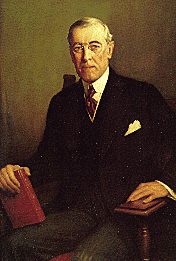
|
Wilson advanced rapidly as a conservative young professor of political science and became president of Princeton in 1902. His growing national reputation led some conservative Democrats to consider him Presidential timber. First they persuaded him to run for Governor of New Jersey in 1910. In the campaign he asserted his independence of the conservatives and of the machine that had nominated him, endorsing a progressive platform, which he pursued as governor.
He was nominated for President at the 1912 Democratic Convention and campaigned on a program called the New Freedom, which stressed individualism and states' rights. In the three-way election he received only 42 percent of the popular vote but an overwhelming electoral vote.
Wilson maneuvered through Congress three major pieces of legislation. The first was a lower tariff, the Underwood Act; attached to the measure was a graduated Federal income tax. The passage of the Federal Reserve Act provided the Nation with the more elastic money supply it badly needed. In 1914 antitrust legislation established a Federal Trade Commission to prohibit unfair business practices.
Another burst of legislation followed in 1916. One new law prohibited child labor; another limited railroad workers to an eight-hour day. By virtue of this legislation and the slogan "he kept us out of war," Wilson narrowly won re-election. But after the election Wilson concluded that America could not remain neutral in the World War. On April 2,1917, he asked Congress for a declaration of war on Germany.
Massive American effort slowly tipped the balance in favor of the Allies. Wilson went before Congress in January 1918, to enunciate American war aims--the Fourteen Points, the last of which would establish "A general association of nations...affording mutual guarantees of political independence and territorial integrity to great and small states alike."
After the Germans signed the Armistice in November 1918, Wilson went to Paris to try to build an enduring peace. He later presented to the Senate the Versailles Treaty, containing the Covenant of the League of Nations, and asked, "Dare we reject it and break the heart of the world?"
But the election of 1918 had shifted the balance in Congress to the Republicans. By seven votes the Versailles Treaty failed in the Senate.
The President, against the warnings of his doctors, had made a national tour to mobilize public sentiment for the treaty. Exhausted, he suffered a stroke and nearly died. Tenderly nursed by his second wife, Edith Bolling Galt, he lived until 1924.

 |

|

|

|